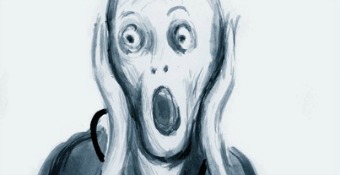Do you want fries with that antigen test?

I felt incredibly embarrassed and stupid recently when, after nearly smacking into a massive queue of cars snarled around and way beyond an Essex roundabout, I jumped to the conclusion that these were the hamburger-deprived converging on a just re-opened drive-through.
Silly me. As I extricated my car from the honking masses and noticed the masked marshalls and regimental organisation, I twigged that this was in fact the queue for the local Covid-19 antigen testing centre. Just goes to show that you shouldn’t let your prejudices lead you to false conclusions, not even in Essex, as I explained to my partners the other day over coffee.
Which was when they gently pointed out that, no, actually, that really was the queue for McDonalds. It had been on the news and everything.
So some people are clearly desperate to return to the old normal. Others, though, are much less willing, such as the 90% of GPs who want to continue with remote consultations post Covid-19.
Do I count myself among those 90%? Well, remote consulting does have some clear advantages:
- You can do it from home
- The waiting room is lovely and quiet
- I don’t really like examining patients as I don’t know where they’ve been
- I’m saving loads on air freshener
- You can do other things while consulting without the patient knowing, which to educationalists and other consultation junkies would mean diligently jotting down key points of the interaction to make sure you’ve covered everything, but to me means looking stuff up to appear clever and informed, or watching things like this to stay awake.
But there are disadvantages, such as:
- You feel like you’re working in a call centre, although the pay is better
- The bit you’re trying to examine by video always seems to dissolve into pixels (unless that’s what the rash actually is)
- The raging sense of injustice you feel when you realise after ten minutes of hard telephonic graft that you really do need to see the patient and so will have to start all over again
- The fact that there is virtually no chance of a DNA-induced hob-nob and coffee break because even those patients who respond with, ‘Oh, I booked this so long ago I’d forgotten all about it’ seem to be able to instantly resurrect their symptoms for the occasion, or dream up some new ones.
- The pain of my olecranon bursitis caused by me constantly leaning on my elbows when I’m on speaker-phone; I believe there is a GP epidemic of this which has been cruelly overlooked by the national media.
Ultimately you have to weigh all these things up and make your choice. Although, of course, it may be taken out of our hands if plans to offer Covid swabs in primary care take off. In which case, I’m off for a Maccy Ds, and I may be some time.
Dr Tony Copperfield is a GP in Essex. Read more of Copperfield’s blogs at http://www.pulsetoday.co.uk/views/copperfield









